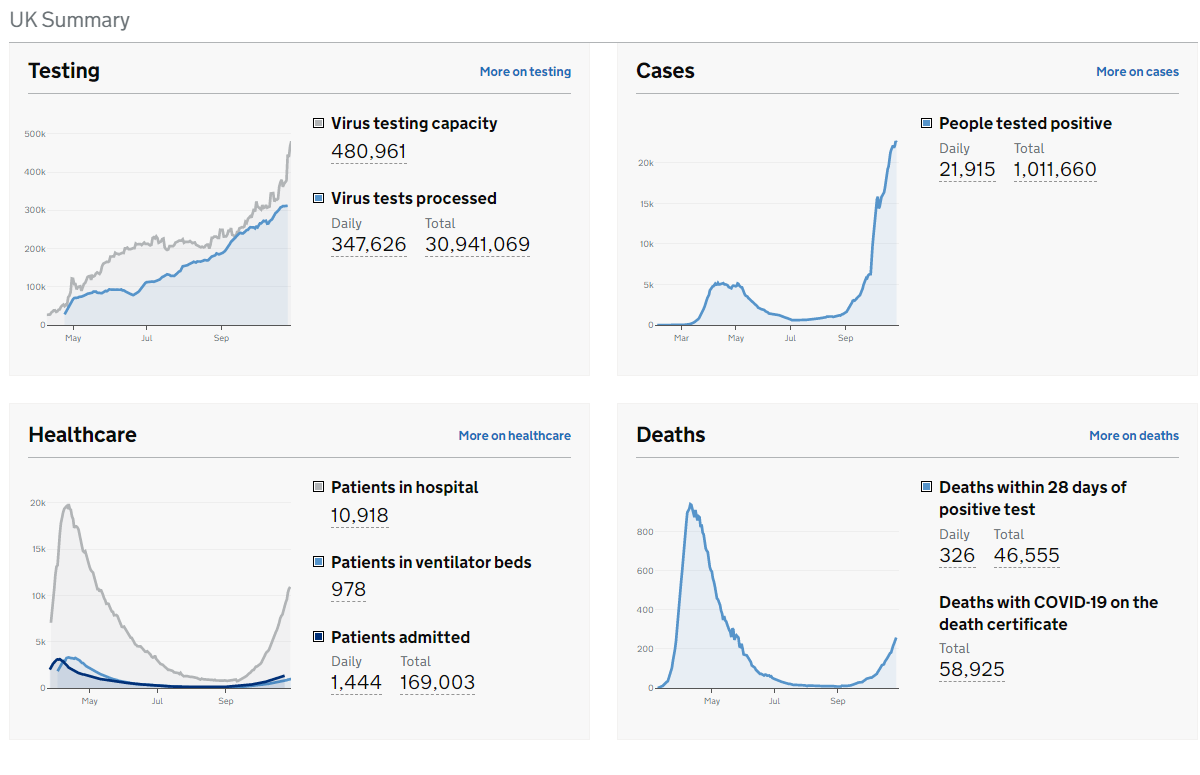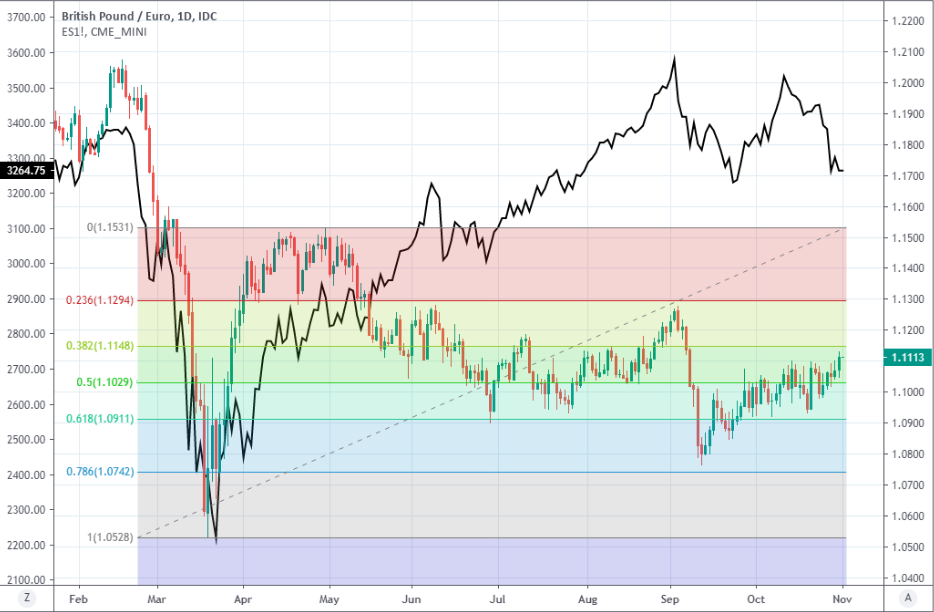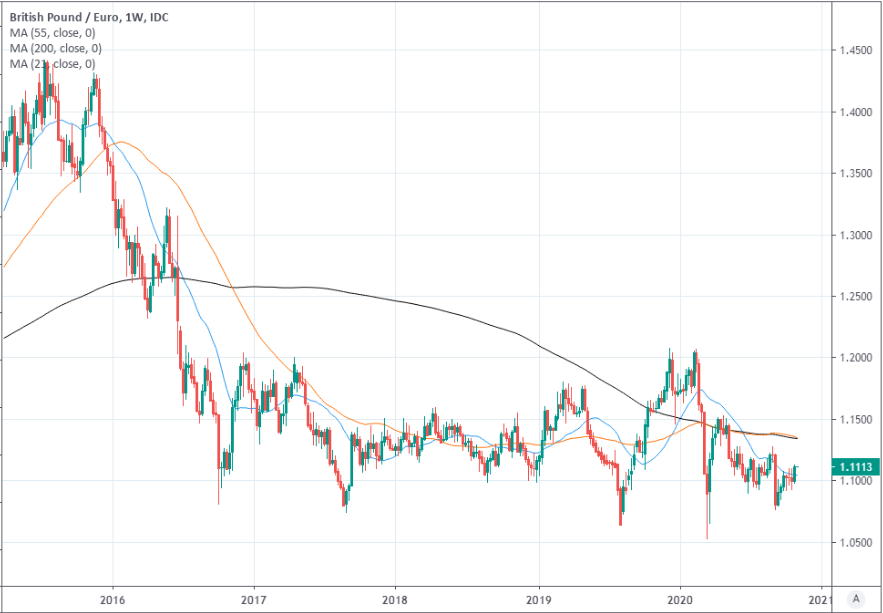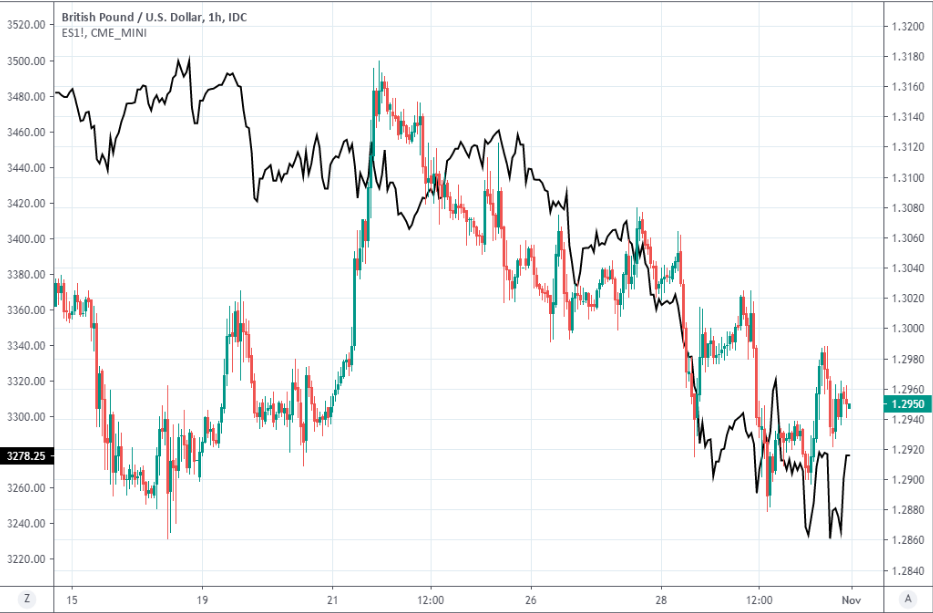Pound-Euro Week Ahead Forecast: Recovery at Risk as Lockdown, Bank of England Decision Loom
- Written by: James Skinner
- GBP/EUR near two-month highs
- But GBP vulnerable to new lockdown
- GBP could fade back at 1.10
- Resistance seen above 1.11 with election, BoE decision in focus

Image © Adobe Images
- GBP/EUR spot rate at time of publication: 1.1088
- Bank transfer rate (indicative guide): 1.0800-1.0879
- FX specialist providers (indicative guide): 1.0970-1.0988
- More information on FX specialist rates here
Pound Sterling dropped by over a quarter of a percent against the Euro, Dollar and other major currencies at the start of a new week with analysts warning further losses are possible over coming days as another shutdown in the UK trumps positive Brexit developments.
The Pound-to-Euro exchange rate last week rallied to fresh seven-month highs as after a series of positive headlines related to Brexit trade negotiations, with European Commission President Ursula von der Leyen saying on Friday talks had moved along, bolstering expectations that a deal will be reached this month and enabling Sterling to get the better of a faltering Euro.
However, confirmation on the weekend that England is to join Wales, Scotland and Northern Ireland in a more restrictive lockdown will likely overshadown developments on the Brexit front over coming days, as markets attempt to assess the scale of the economic impact of the new measures and what they mean for the Bank of England who will on Thursday deliver their latest policy decision.
The shutdown in England is currently intended to run between Thursday 05 November and Wednesday 02 December and will see all supposedly non-essential businesses forced to close again and movement outside of the home restricted.
However, media reports out Monday suggest the government intends to extend the lockdown into the new year.
"As a result, there are big downside risks to our already downbeat forecast that GDP won't rise at all in October, November and December. We think the deteriorating economic outlook will prompt the Bank of England to announce another £100bn of Quantitative Easing at its meeting," says Ruth Gregory at Capital Economics.
Above: UK Government coronavirus dashboard Sunday, 01 November.
Downing Street says it's hoping to mitigate the threat posed to the health service by rising infection numbers, but will effectively snuff out the economic recovery in the process, which might dent investor appetite for Sterling this week.
The Pound ended last week just above a key resistance level located at 1.1104 but could struggle to sustain such lofty heights, especially if the Euro finds its footing after having fallen nearly 2% against some currencies last week.
Karen Jones, head of technical analysis for currencies, commodities and bonds at Commerzbank says this resistance level will "need to hold" for a negative bias to remain.
Above: GBP/EUR with Fibonacci retracements (supports) of March recovery, S&P 500 futures (black line, left axis). Lock in today's exchange rate for use over coming months, thereby protecting your international payments budget. Learn more here.
Jones says the 1.1104 level is a major faultline for the technical trend in the Pound-to-Euro rate, which could rise as far as 1.1281 if Sterling sustains last week's move above resistance.
Judging by early price action on Monday, this resistance level does appear to have indeed held.
Jones is a seller of the Sterling and is looking for a fall to 1.0750 over the coming weeks.
Commerzbank is meanwhile looking for the Pound-to-Dollar rate to slide back toward 1.28 ahead of a fall to 1.27, which could pull the Pound-to-Euro rate back toward 1.10 over the coming days if EUR/USD rate is able to stabilise around Friday's 1.1650 level.
Thursday's Bank of England (BoE) monetary policy decision will be watched closely in light of the looming national shutdown, given the bank had already been expected to increase its quantitative easing target even before this weekend's announcement.
Analysts and economists expect as much as £100bn to be added to the £745bn programme, but will be listening most closely for anything more on the BoE's newfound interest in negative interest rates.
The BoE is actively contemplating the technicalities of cutting Bank Rate below zero, having asked commercial banks for information on how they'd go about implementing a negative interest rate policy, and has occasionally inspired weakness in the Pound with public discussion of the matter. The decision is out at 12:00 pm London time on Thursday and will come alongside the latest quarterly inflation report containing the BoE's latest forecasts for the economy.
"Though we are below the Bloomberg consensus (£100bn additional QE next week), we see no need for a bigger package unless the MPC alters the pace of buying," says Fabrice Montagne, an economist at Barclays. "The main area of focus will be discussion around the future path of policy. We see clear economic risks from persistently high numbers of COVID-19 cases and Brexit, a combination of which could force the BoE to unleash a fresh round of stimulus."
Above: Pound-to-Euro rate shown at weekly intervals with selected moving-averages. Automatically secure your ideal exchange rate when it is hit by using a limit order, find out more here.
With investors' verdict on the new lockdown aside, the Pound-to-Euro rate could be sensitive in the coming days to the impact the U.S. election which is expected to have an impact on all financial assets, including currencies.
"A clear Biden victory can reduce political uncertainty and allay market protectionist angst, which could boost risk sentiment and weigh on the USD," says Valentin Marinov, head of FX strategy at Credit Agricole CIB. "A surprise victory by Donald Trump would lead to a USD rally across the board."
Polling day is Tuesday and the market will begin to have an idea early on Wednesday of whether the widely anticipated 'blue wave' in favour of the opposition Democratic Party candidate Joe Biden has materialised. The consensus view is that this will sink the Dollar and support stock markets, which might normally be expected to lift Sterling, although Biden presidency could make a UK-U.S. trade deal less likely and so is also potentially a bearish outcome for the Pound.
"We suspect that a “clean sweep” for either the Democrats or, less likely, the Republicans would be better received in the stock market – and worse in the Treasury market – than any outcome that left Congress split," says Oliver Jones at Capital Economics. "A contested outcome would probably be the most negative of all for equities in the short term."
Furthermore, and with the incumbent President Donald Trump's Republican Party closing the gap with his rival in some states as the ballot approaches, the perceived probability of a contested election could be rising.
Above: Pound-to-Euro rate shown at hourly intervals with S&P 500 futures (black line, left axis).
A contested election is the last outcome that investors would want to see given that it could lead to weeks of wrangling in the Supreme Court so if investor unease over the outcome of the vote grows enough to weigh further on stock markets, it could add to Sterling's vulnerability this week.
A surprise victory by the incumbent President Trump would lead to a stronger Dollar, many analysts say.
"The UK and EU sides need to find a very narrow corridor to a political declaration that simultaneously gives each side a 'win' for their respective audiences. Here, the dispute arbitration mechanism is going to be a big issue, because this is the means through which Brussels will seek to retain control," says Stephen Gallo, European head of FX strategy at BMO Capital Markets. "We think the initial phase of broad GBP appreciation once a deal is concluded should be faded - specifically because dispute arbitration will probably yield a more volatile bilateral relationship going forward (in addition to all the other factors which are already weighing on the GBP's fundamental outlook)."
Renewed lockdowns in Europe had already troubled the Euro when the European Central Bank (ECB) encouraged the sell-off by giving advanced warning of December policy changes that could see Eurozone borrowing costs and bond yields falling further. But with Prime Minister Boris Johnson following in the footsteps of European counterparts at the weekend by announcing another national lockdown for England, investor appetite for the Pound could be dented early in the new week.
"The correction lower in risk assets over the past week in response to the national lockdown in France highlights that downside risks for the GBP could increase if the risk asset sell-off intensifies," says Lee Hardman, an analyst at MUFG. "The BoE will also be meeting in the week ahead and is expected to announce a GBP100bn QE expansion. The GBP will be more sensitive though to any further policy signal over the possibility of negative rates."








